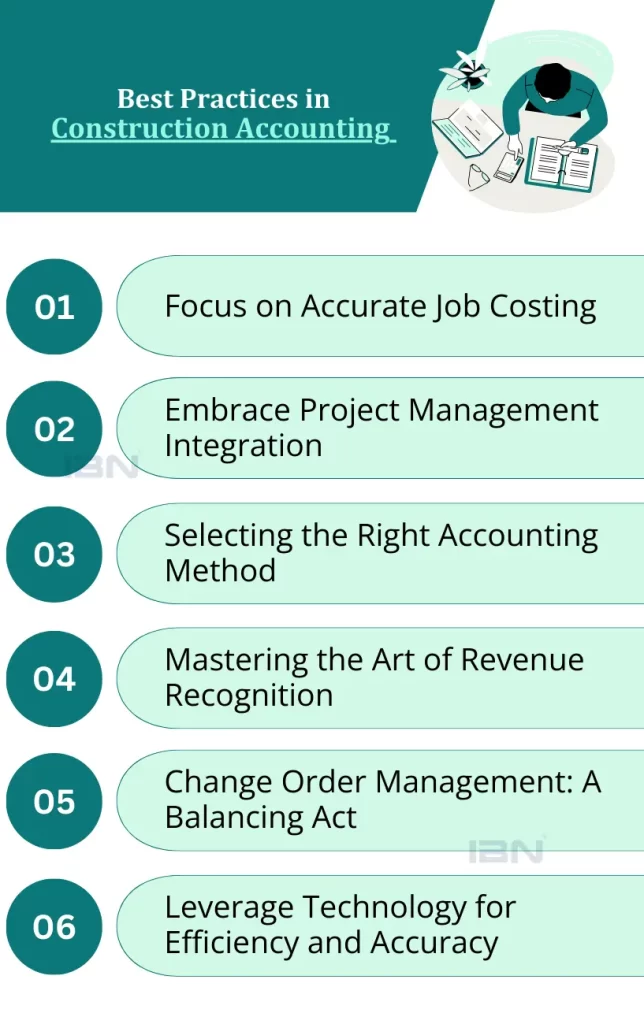Construction Accounting: Navigating Taxes and Expenses in the Construction Sector
Construction Accounting: Navigating Taxes and Expenses in the Construction Sector
Blog Article
Recognizing the Significance of Construction Accounting for Successful Project Management

Role of Construction Bookkeeping
Construction bookkeeping functions as the foundation of financial management in the building and construction sector, making certain that tasks are finished within budget and financial goals are met. construction accounting. This specialized accounting strategy addresses the distinct obstacles encountered in construction jobs, including varying task periods, changing expenses, and multiple stakeholders
One of the primary duties of building and construction audit is to provide precise expense evaluation and monitoring throughout the task lifecycle. This assists in informed decision-making, allowing job supervisors to readjust timelines and sources successfully. Furthermore, construction accountancy boosts money circulation administration by checking accounts payable and receivable, hence ensuring that funds are readily available for timely settlements to subcontractors and providers.
It equips job managers with the needed economic data to prepare detailed economic declarations, which are crucial for audits and monetary evaluations. Ultimately, the function of building accountancy prolongs beyond plain monetary monitoring; it is indispensable to tactical planning and functional efficiency, driving the success of building tasks in an affordable landscape.
Secret Components of Building And Construction Accountancy

Budgeting develops a financial framework that guides project implementation, permitting supervisors to allocate resources effectively and anticipate potential economic difficulties. Accurate price monitoring is crucial for surveillance costs in real-time, helping to recognize differences in between predicted and actual expenses. This enables prompt modifications to maintain the task on budget.
In addition, monetary coverage offers stakeholders with a clear photo of the project's economic health. Regular records, such as earnings and loss declarations and cash money flow evaluations, facilitate notified decision-making and boost transparency among all parties included.
Furthermore, compliance with sector policies and bookkeeping standards is crucial. This makes sure that financial methods are not only reliable but likewise authorized, securing the organization against lawful repercussions. By incorporating these key elements, building and construction bookkeeping cultivates an organized strategy to managing monetary sources, eventually adding to the effective conclusion of construction tasks.
Benefits for Job Supervisors
Leveraging efficient building and construction accounting practices offers job supervisors with a plethora of advantages that boost both operational efficiency and financial oversight. One significant benefit is improved budget plan management. Accurate monitoring of revenues and expenditures permits job supervisors to keep an eye on monetary performance in actual time, ensuring projects continue to be within spending plan and assisting in timely modifications when required.
Additionally, construction bookkeeping simplifies cash flow monitoring, enabling task supervisors to enhance and anticipate economic demands source allowance. By understanding cash money inflows and outflows, they can better manage settlements to distributors, subcontractors, and workers, consequently preventing costly hold-ups.
In addition, robust bookkeeping systems give extensive coverage capabilities. Project supervisors can generate records that supply understandings into job profitability, expense variances, and source utilization. This data-driven technique cultivates informed decision-making, permitting managers to determine possible issues proactively and carry out corrective procedures.
Last but not least, adherence to building accountancy standards makes certain compliance with governing and legal needs, decreasing the risk of disputes or charges. On the whole, reliable construction accountancy equips project managers with the tools essential to drive task success, enhance stakeholder confidence, and promote long-term business development.
Typical Obstacles in Building Accountancy
Numerous job supervisors come across substantial obstacles in building and construction accounting that can impede task success. Among the main difficulties is the intricacy of tracking numerous task sites, each with unique budget plans, timelines, and resource allocations. This requires meticulous focus to detail, which can be frustrating without a durable accountancy system in area.
Additionally, varying material prices and labor prices can make complex spending plan administration, making precise forecasting difficult. Project supervisors usually battle to resolve these prices with real expenditures, leading to possible economic disparities.
Additionally, building accounting entails compliance with various laws, consisting of tax commitments and labor regulations. Browsing these guidelines can be complicated, particularly for managers who might not have a strong audit background.
One more significant obstacle is handling cash circulation, which is critical in the building and construction industry. Hold-ups in invoicing, payments from customers, or unexpected job changes can produce capital lacks, threatening the task's progression.
Lastly, efficient interaction between task managers, accounting professionals, and field teams is vital. Misconceptions can result in unreliable financial reporting, further making complex project administration initiatives. Dealing with these obstacles proactively is vital for effective construction bookkeeping.

Ideal Practices for Effective Accounting
While navigating the intricacies of building accountancy can be complicated, adopting finest techniques can considerably enhance financial monitoring and job success. One fundamental practice is maintaining prompt and precise records. Carrying out durable accounting software program customized to construction tasks can enhance information entrance, invoicing, and reporting, decreasing errors and conserving time.
In addition, developing a clear budget and normal surveillance against this spending plan are crucial. Using a system of regular monetary reviews allows more info here task supervisors to determine variances early, promoting prompt decision-making. It is likewise vital to separate job costs into indirect and straight categories, making it possible for more clear understandings into earnings.
Another ideal method involves cultivating open communication amongst all stakeholders. Regular updates and joint conversations about monetary status can make sure everyone is aligned and notified. Educating staff in construction-specific accountancy concepts further improves expertise and accuracy.
Last but not least, making certain compliance with appropriate audit standards and laws is non-negotiable. Routine audits and inner reviews contribute to openness and accountability, constructing trust with clients and stakeholders. By concentrating on these best techniques, construction firms can enhance their audit processes, inevitably driving task success and financial stability.
Final Thought
In conclusion, building audit plays a pivotal role in ensuring successful project administration by find out here now helping with accurate economic oversight and boosting decision-making. By incorporating crucial parts such as price estimate, capital monitoring, and conformity, task supervisors can browse usual obstacles and utilize ideal techniques for efficient accounting. Ultimately, a robust construction accounting framework not just safeguards spending plan honesty yet likewise adds to the overall economic wellness of building and construction tasks, cultivating lasting success within the sector.
By incorporating these crucial elements, building accountancy promotes a structured approach to taking care of economic sources, eventually contributing to the successful conclusion of building and construction tasks.
Precise tracking of expenditures and profits enables project supervisors to check financial performance in actual time, making certain tasks continue to be within spending plan and promoting prompt adjustments when necessary.
Job supervisors can create records that use visite site insights right into project success, expense variances, and resource utilization.Lots of job managers run into considerable challenges in building bookkeeping that can hinder task success. construction accounting. Ultimately, a durable construction accounting structure not only safeguards budget plan honesty but additionally adds to the total monetary wellness of construction tasks, promoting lasting success within the industry
Report this page